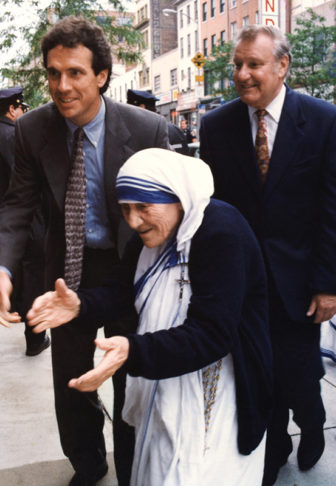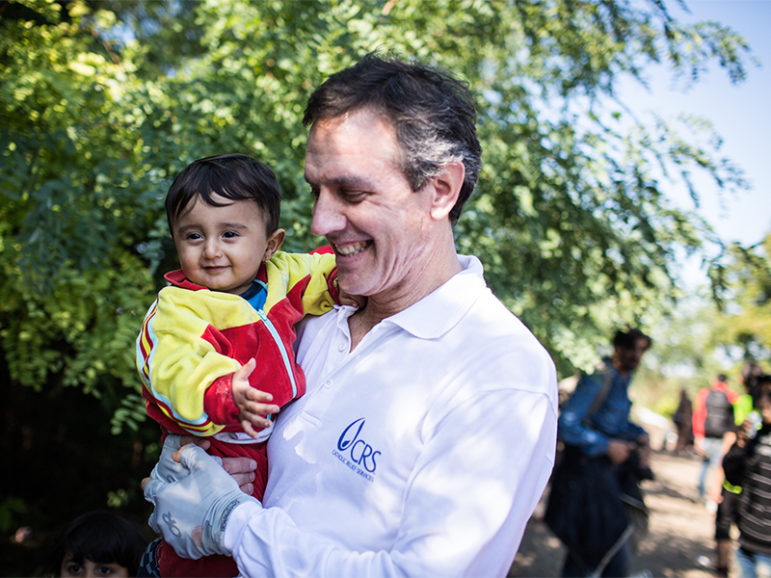(RNS) Soon after Hurricane Matthew slammed into Haiti in October, veteran humanitarian worker Sean Callahan was on the ground, viewing the destruction, meeting victims and strategizing about plans for recovery.
Callahan has spent his entire professional career — nearly three decades — working for Catholic Relief Services, the international relief agency of the U.S. Catholic Church. This week, he became the group’s new president and CEO, replacing Carolyn Woo who retired.
The U.S. Catholic bishops founded CRS during World War II to help Europe and its refugees. Today, the group works in more than 100 countries, providing emergency aid and assisting in long-term development. With a budget of nearly $900 million dollars, CRS has become one of the largest faith-based relief agencies in the world.
[ad number=“1”]
Kim Lawton of the PBS television program “Religion & Ethics NewsWeekly” traveled to Haiti with Callahan and spoke with him about his mission, the challenges he faces, and what he learned working with Mother Teresa in India. This interview has been edited for length and clarity.
How do you describe your mission at CRS?
I see it as really trying to be a beacon of light in some of the darkest places around the world. We go there, invited in by the local community, trying to bring either expertise or solidarity or some type of commitment that helps the local community develop and become stronger. Sometimes people in these situations feel isolated, and they don’t know that people outside care about them. One of the things that we do is bring that message from overseas, that they’re not alone, that there are people that care about them.
And how do you see that representing your Catholic faith?
The option for the poor. We always go for assisting the poorest of the poor in every way possible. We’re very lucky that we can live the gospel, because it is good news. It’s bringing the solidarity from one community to another.
Some conservative Catholic bloggers have criticized CRS for partnering with certain groups that don’t adhere to Catholic teachings on issues such as abortion and artificial contraception. How do you respond?
[ad number=“2”]
We are an organization of the Catholic Church in the United States, and we’re faithful to the traditions of the church. So we are a pro-life organization. We don’t support abortion or artificial contraception. Some of our partners may not agree with us. If there is a question about either an organization or a relationship, we have, an advisory council of moral theologians that gives us advice. Our board of directors has bishops and lay people who also review the partnerships and relationships.
If we have the opportunity to save a life, we must do it. Malaria would be a good example. Sometimes the vendors who provide malaria nets are not consistent with Catholic teaching in everything they do. But if we can provide malaria nets and anti-malarial drugs to children, we can then protect those lives. And so over the last several years, in coordination with other groups, we’ve saved over 5 million lives in Western Africa. If we can do that, it would be against Catholic teaching not to assist them.
How did you get involved in humanitarian work?
I grew up in an Irish Catholic family in Boston and after I finished my education, I thought I should give something back. Catholic Relief Services came to my graduate school, (Tufts University) and they ended up offering me a position in Costa Rica for $12 a day. I committed for one year and thought it would be a year of service. But it was also a year of learning about my purpose on this earth and how I can contribute to making it a better world. I found that it was a calling I hadn’t known that I had.
You worked for CRS in India and got to know Mother Teresa and her Missionaries of Charity order. What did you learn from them?

Sean Callahan, left, with Mother Teresa during her 1996 visit to CRS Headquarters. Photo courtesy of Catholic Relief Services
When I started working in Calcutta, it was overwhelming. There were 3 million people living on the streets, a million of them children. I’d walk through the city and see this dire poverty, and to be honest with you, it was something that got me down. I thought our system was failing all these people.
Seeing the inner strength that Mother Teresa and the sisters had, the joy that they had living in it was incredible. She just had this effusive spirit of caring and giving. It was then that I really saw that we could all contribute to changing poverty. It’s not just economic change, but also spiritual change. It’s a change of caring about people and being open to new people and being able to embrace them.
Why has CRS been raising concerns about the rising anti-refugee/anti-immigrant climate here in the U.S.?
I don’t know if it’s more prevalent now. It’s at least a little bit more open now. I think that may actually be a blessing, because now we can talk about it and address it head on. Often, people react to what seems like the evil of ISIS, and they react in a way that doesn’t show our true character, that puts walls around us and bars us from welcoming other people. We have to build unity. We have to reach out to others, show that we’re not afraid.
[ad number=“3”]
What do you see as your biggest challenges?
The toughest thing for me is when you see children that are not having the opportunity that they should have. I think of my family and my kids, and by some accident of birth, they’re having three square meals a day. We want every child to reach his or her full human potential. Whether it’s in Haiti, whether it’s in Ethiopia, or whether it’s the refugees coming out, seeing those children just really grabs me.
What gives you hope?
The good, that common good, outweighs the evil that’s being done in those areas.
(A version of this story first appeared on the PBS television program “Religion & Ethics NewsWeekly”)





